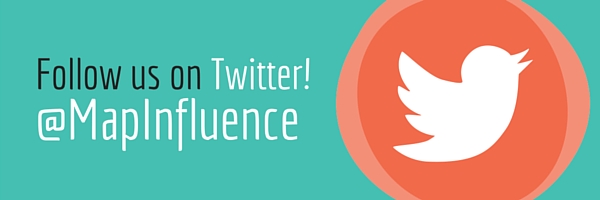#STORIES AND THOUGHTS
The streets of Paris are as familiar to me as the streets of Beirut (Global Voices) “These have been two horrible nights of violence. The first took the lives of over 40 in Beirut; the second took the lives of over 120 people and counting in Paris. It also seems clear to me that to the world, my people’s deaths in Beirut do not matter as much as my other people’s deaths in Paris”, says the Lebanese blogger Joey Ayoub in this post which was shared more than 10 thousand times in Facebook.
How open company data was used to uncover the powerful elite benefiting from Myanmar’s multi-billion dollar jade industry (OpenCorporates) OpenCorporates data was used to uncover this elite, investigated on an analysis by Global Witness, with the help of Open Knowledge. You can find the white paper here or read it on Medium.
Revealed: The full scale of offshore investment in the UK (Property Week) £263n has been invested in property in England and Wales by companies registered offshore since 2000. This info follows David Cameron’s pledge in the summer to crack down on the use of offshore-registered shell companies to launder “dirty money” in the UK property market.
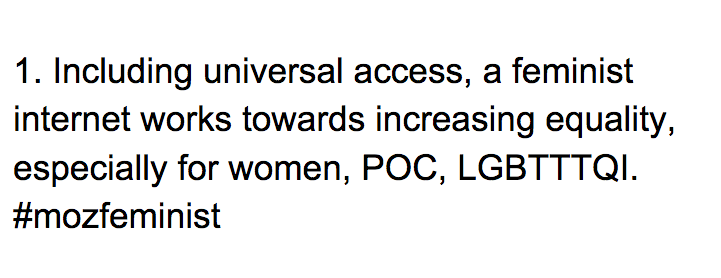 35 people at Mozfest 2015 crowd-sourced a series of Open Web feminist principles. Check them out! (via @MozillaAdvocate)
35 people at Mozfest 2015 crowd-sourced a series of Open Web feminist principles. Check them out! (via @MozillaAdvocate)
NarcoData is a new collaboration that aims to track and visualize the drug cartels of Mexico (NiemanLab) NarcoData, a collaboration between Mexican digital news site Animal Politico and data journalism platform Poderopedia, launched with a mission to shine light on organized crime and drug trafficking in Mexico.
Not so Secures (The Intercept) A massive hack of 70 million prisoner phone calls indicates violations of attorney-client privilege, particularly on at least 14,000 recorded conversations between inmates and attorneys.
Journalist-Engineer (Medium) and Programmer, Not Engineer (The Atlantic) There’s been a lot of naming this past month. Programmer-Not-Engineer, Journalist-Engineer, Data-Journalist, Just-a-Journalist. These articles discuss about these new ‘identities’ and how they are shaping our stories.
The Internet Dark Ages (The Atlantic) “The promise of the web is that Alexandria’s library might be resurrected for the modern world. But today’s great library is being destroyed even as it is being built. Until you lose something big on the Internet, something truly valuable, this paradox can be difficult to understand.”
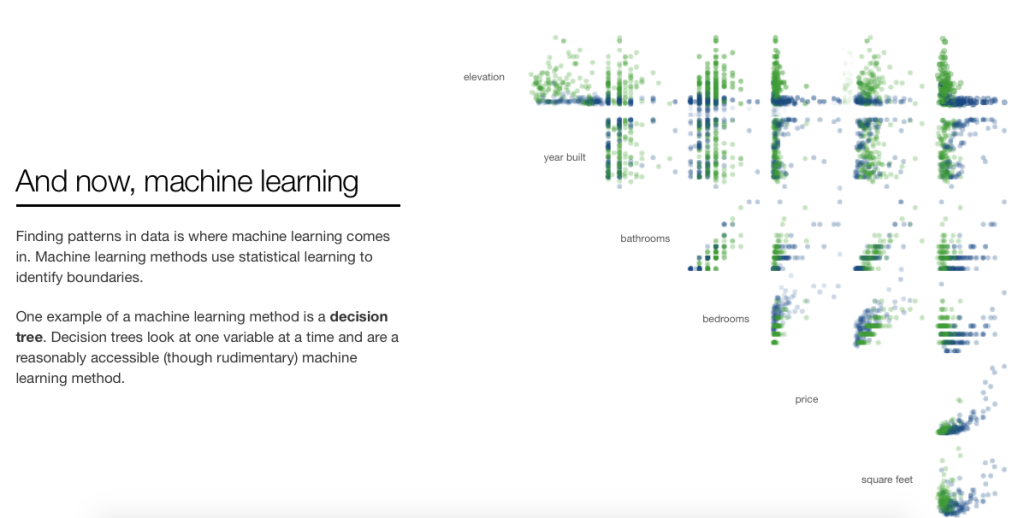 A Visual Introduction to Machine Learning
Keep scrolling on this amazing first part of the machine learning model introduction by r2d3.us. Through its storytelling, it illustrates what it means “to learn without being explicitly programmed”. Wait for their next post, they will be exploring overfitting, and how it relates to a fundamental trade-off in machine learning.
A Visual Introduction to Machine Learning
Keep scrolling on this amazing first part of the machine learning model introduction by r2d3.us. Through its storytelling, it illustrates what it means “to learn without being explicitly programmed”. Wait for their next post, they will be exploring overfitting, and how it relates to a fundamental trade-off in machine learning.
#RESOURCES AND DATASETS
Oil Map Concessions The first open oil concession map of the world covers 33 Sub-Saharan countries and includes the shapes of over 1.750 oil blocks, as well as references to 200 corporations that were given the licenses for these blocks, and links to more than 120 of these full-text contracts.
Three refugee datasets for the 19 Million Project The project is currently working on how data, design and journalism can best tell the heartbreaking stories produced by the refugee crisis which has sprung out of Syria, Iraq and Afghanistan.
The Best Twitter Bots for Keeping Tabs on the Government If you’re looking for real-time updates to the Foreign Intelligence Surveillance Courts docket, or maybe you want to catch the next time someone from a Capitol Hill IP address edits Wikipedia, this is for you.
500 new Government datasets in South Africa South Africa’s first cohort of OpenGov Fellows have liberated more than 550 Government datasets. The four South African fellows are co-managed by Code for South Africa and Open Data Durban (ODD).
#COMMUNITY
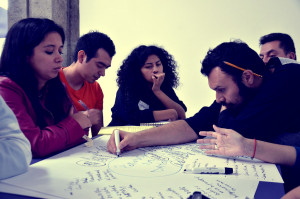 Guest Post: User Needs on Influence Mapping around Latin America
Guest Post: User Needs on Influence Mapping around Latin America
Andrés Snitcofsky (Cargografías) explores front and back-end alternatives for developing influence mapping projects, keeping in mind the different communities around them.
Influence Mapping Infographics

Last September a group of researchers and investigative journalists and technologists working on tools to support them gathered to talk about how to better address their challenges.
On this infographic, we summarize some of the most relevant user needs around entities: finding data, discovering relationships between entities and easily analyzing them, and automating the monitoring process.
See full data in user needs in our Wiki and the full infographic here.
#TOOLS
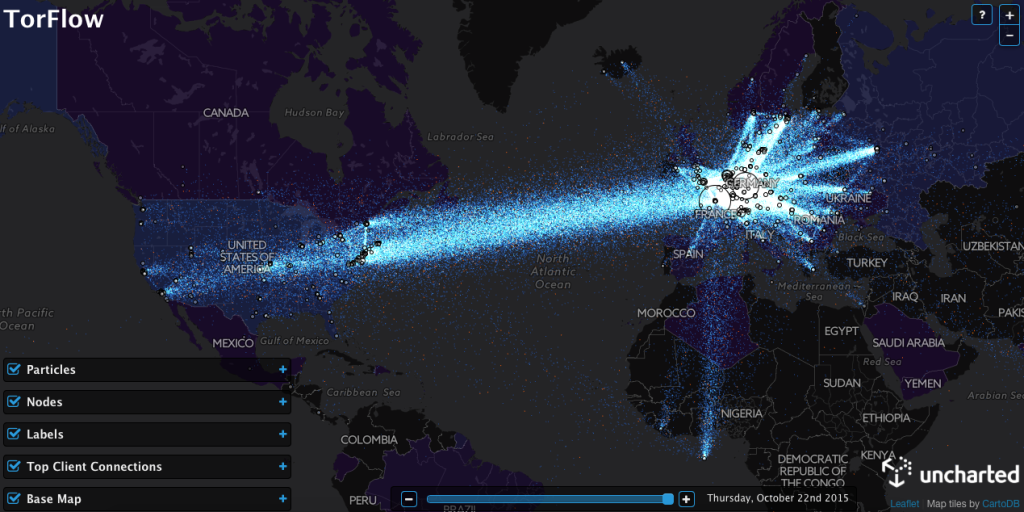
Tor Messenger / After you get mesmerized by this Tor Network visualization, take a look at the new, beta version of Tor Messenger based on Instabird, an instant messaging client developed in the Mozilla community.
Kimono / Turn websites into structured APIs from your browser in seconds. Use the API output in JSON or as CSV files that you can easily paste into a spreadsheet.
Enigma / Enigma centralizes and connects 5.000 local, state, federal and international public databases. From Government spending, to asset ownership.
#MAP
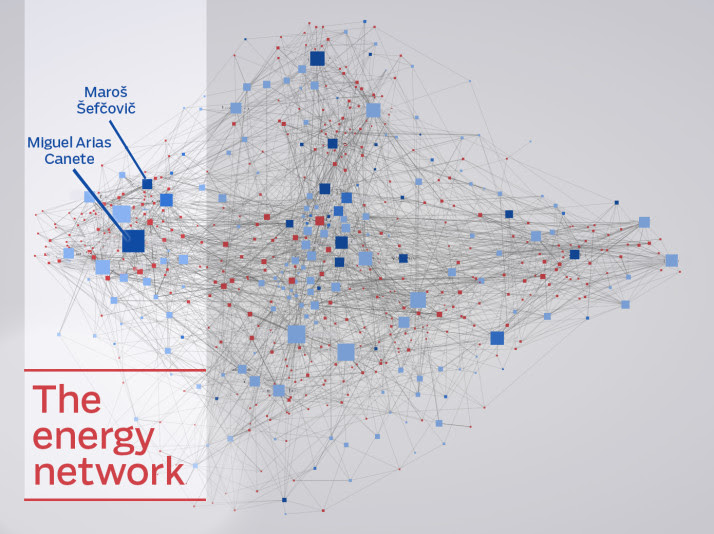
With a few days from the Climate Change Summit in Paris, Laurens Cerulus and James Panichi visualize the lobby-related meetings that have taken place between lobby organizations and cabinet members and directors.
#NEXT EVENTS
Hacks/Hackers #28 - Trolls & Journalism, Image Verification // November 17 (Berlin, Germany)
Coders, journalists, designers unite // November 23 (München, Germany)
Show and Tell- Makers and Content Creators // December 2 (Los Angeles, USA)
#APPLY
Nov. 20: Last day to apply for the Philip Meyer Award from NICAR Nov. 24: Last day to propose a session to OSCON Noc. 30: VI Global Fellowship - Palestine focus. Data science, tech and design to promote a rights based narrative of Palestinian experiences for social justice. Nov. 30: Call for speakers OpenVisConf, open to anyone with a story about the practice of data visualization: industry and academia, technologists and artists, students and teachers. Jan. 13: Responsible Data Forum: Visualization, with focus on risks and mitigations in using data visualization for analysis and advocacy. Jan. 15: Data Governance and Data Quality Conference (DGIQ2016)
